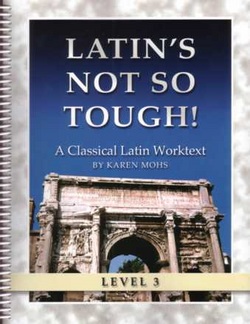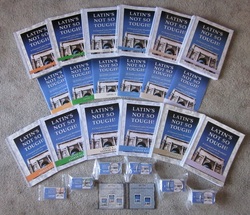 I wouldn't call myself an expert in the Latin language, by any means. I have been guiding students in Latin studies for the last two years, but when I first began presenting lessons in Latin, I was learning it right along with the students. I've noticed that Classical Conversations, a classical homeschooling cooperative, utilizes Latin's Not So Tough in order to teach Latin to their students at various levels, so I've been curious to see this.. I've browsed through Latin's Not So Tough at homeschooling conferences, briefly, but I hadn't been able to sit down with the curriculum to really see what I thought of it... ...until this school year. As a member of the TOS Crew, a curriculum-reviewing group of homeschooling parents who work for "The Old Schoolhouse" homeschooling magazine, I was offered the opportunity to try out Latin's Not So Tough this year. Greek 'n' Stuff, the parent company, provided Level 1, 2, or 3 to us, depending on the ages of our children. I received Level 3 since my children were in the upper elementary and junior high grades. I must admit that after browsing through the student workbook, I was slightly disappointed to see that everything in Level 3, except for a few vocabulary words, had already been learned by my two daughters using the first year material of another Latin language program. I think I was expecting, at first, that Level 3 would be more advanced and would provide more of a challenge to my daughters. However, since they had learned almost everything in Level 3 except for maybe 5-10 vocabulary words, we found that the product wasn't able to be fully used like we would have done if it had been at or above their skill level. What I have learned since I first received Latin's Not So Tough in the mail is that Level 3 is the beginning level for students who are in upper elementary grades or older. Basically, I received a beginning level student textbook, answer key, and pronunciation guide - when I would have found Level 4 or Level 5 to be more useful for my own family, if that had been offered to us for review purposes. But that's okay. I was still able to look closely at Latin's Not So Tough to evaluate the program and see "close up" what it was like. Latin's Not So Tough was designed to very gently guide students through the beginnings of the Latin language without it causing stress to the parent or the child. It is based on the classical pronunciation of Latin, vs. the ecclesiastical (church Latin) pronunciation of Latin. The differences are minor between the two, but I thought you may want to know this in case it's important to you for your children to learn ecclesiastical Latin. Because of its gentle approach, the material is not really broken down into weekly or daily lesson plans, although some guidelines are provided. Karen Mohs, the author, ideally prefers that students complete one page of their workbook each day, as well as practicing flashcards daily. I did notice in very tiny print that sections are divided into actual "lessons", but it isn't meant to stand out to the parent or child. Simply working through one workbook page each day is adequate without having to do a lot of lesson planning on the calendar. So for those of you who don't have much time to plan lessons during the week, this is definitely a bonus for you. Teacher tips for each lesson are provided at the beginning of the answer key book. The teacher tips include derivatives to help students learn vocabulary, although the derivatives aren't reinforced in any of the workbook pages or flashcards, and I didn't see a place on the workbook pages to include this information, although the parent could instruct the child to include them on the same pages each week. If you aren't sure what a derivative is, let's say that the new Latin vocabulary word is "pugno", which means "I fight." A derivative of "pugno" would be the English word, "pugnacious". A very thorough list of derivatives in the teacher tips are provided for each of the vocabulary words in the lessons. In fact, this list of derivatives is much more extensive than what I've seen in other Latin programs. Unfortunately, there seems to be no "built-in" method of including studies of these derivatives into the Latin's Not So Tough program, unless the parent figures out a method of including them in regular study with the student. I've notived over the last two years that learning derivatives well are one of the better methods of remembering new Latin vocabulary words. My students tell me that, as well. The pronunciation CD goes step by step right along with the lessons in the student workbook, and the girl's voice on the CD is very clear and distinct without being distracting at all. I placed the CD into my DVD-ROM drive on my computer, and I didn't seem to see an index or table of contents, so I would probably choose to use the CD in a regular CD player, and then I could skip through the lessons to get to the desired audio portion. Also contained within the Teacher Tips section at the beginning of the answer key book are suggested Latin resources to help both the parent and the student. These would be an additional cost to purchase, but I do think it is useful to suggest additional resources. Like I mentioned already, the Teacher Tips section is very helpful. Yet for someone who may have never studied Latin before, I'm not sure that it's adequate for the parent to use to communicate those concepts to the child. Some children wouldn't mind learning Latin with the inductive (part-to-whole) method in Level Three, although Level Four does transition to a deductive ("whole to parts", "tell my why and how") approach. For me, not having studied Latin, French, or Spanish before, I decided that this material would be difficult for me to explain to children who would want to know "why" word endings were changing or other questions that undoubtedly would come up during the school year. Now that I've guided two years of Latin classes, I would be able to answer most of my students' questions about what is contained in Level 3 of Latin's Not So Tough, but prior to studying Latin myself, I think I would have found it a bit tricky to use this program to teach Latin to my children. They are too inquisitive and want to know WHY! I don't think I would have known how to help them. The index in the back of the student workbook is thorough and organized well, but to be truthful, if I hadn't already studied Latin with my children, I wouldn't have had a clue how to use pieces of the index which used words like "conjugation", "declension", and other parts of learning Latin, since those particular words don't seem to be introduced to the students at all in Level 3 in their workbook pages. I have a friend who has used Latin's Not So Tough at all of its levels with her two very intelligent and diligent children. Her opinion after teaching multiple levels of this is that the program would have been difficult to have used with any level of competence if she hadn't already known French and Spanish. She noted that the student workbook included pages to reinforce the vocabulary, like matching and "circling the correct answer" exercises, but some of the other pages were difficult for them to figure out because they didn't know why some word endings changed the way they did in the lessons. The answer key book didn't seem to offer rules, helps, or explanations; instead, it simply included the answers to the workbook pages (except for the brief Teaching Tips). As her family advanced through the levels of books and began to learn the different endings of Latin words, they discovered that sometimes, they couldn't figure out why certain things were done in a certain way. Her comment to me was that it probably would have been frustrating for them all if she didn't already know portions of the romance languages. She mentioned that since the other languages of which she had knowledge came directly from Latin, they were connected enough to make sense for her to then explain to her children. I was a bit disappointed to hear this from my friend whose opinion I greatly respect. Many homeschooling parents haven't extensively studied foreign languages, so this could possibly be quite frustrating to the parents trying to use this curriculum. On the flip side of things, I would say that most parents would comment that Latin's Not So Tough would be extremely easy to use, especially if their children weren't asking the why's and how's of the language. I would say that for visually challenged students, the layout of the workbook pages is clean and exclusively black and white. The directions for each page are clear and easy to understand. At the bottom of each page is a little check box near which is written: "I practiced my flashcards today." I thought that was an appropriate reminder each day for the child to work through the flashcards on a daily basis. As far as any other methods of reviewing the material in this book, however, I didn't see anything. It is pretty basic in that it merely provides one workbook page per day plus the use of flashcards. You may view samples of the various levels and peruse the Table of Contents HERE. Just scroll down to the Latin's Not So Tough section. The flashcards are on regular printed paper at the back of the student workbook, so to make them durable for daily use, you'd want to copy these flashcards onto cardstock and possibly laminate them and put them on a wire ring so none of them would get lost. Or, you could purchase Latin's Not So Tough's "Flashcards on a Ring." After studying Latin's Not So Tough for myself, I'd say that this kind of program would work well for homeschooling parents who have some experience with declensions and conjugations with at least one of the romance languages - or it would work well for children who naturally aren't quite as inquisitive as some. It provides a very gentle, slow approach to learning a foreign language, which can help children not stress out quite as much. If you haven't had any experience with declensions and conjugations in a foreign language, however, this program will still work for you, if you are willing to invest time and money into some of the other suggested resources and books and learn a bit more about the material for yourself before teaching your children, especially if your children tend to be the inquisitive type like mine! Also, if your children really don't enjoy using flashcards, you could use one of the free online flashcard-maker websites like Quizlet and type out the vocabulary words for online review and more independent study. Here are the Latin's Not So Tough materials which are necessary for each level, except that the parent may choose from either the "Answers Only" answer key or the "Full Text" answer key: Latin Student Workbook ($14.95 - $25.95) Latin "Answers Only" Answer Key ($4.00) or Latin Level One "Full Text" Answer Key ($14.95 - $25.95) Latin Level One Quizzes/Exams ($5.50) Latin Level One "Flashcards on a Ring" ($6.00 - $12.00) or make your own or place them online for free Pronunciation CD for Latin - covers Levels One-Three or Levels Four-Five ($10.00) or Pronunciation Cassette Tape - covers Levels One-Three or Levels Four-Five ($8.00) Read what other TOS Crew members have to say about Latin's Not So Tough! Disclosure: I received Level 3 of Latin's Not So Tough by Greek 'n' Stuff for the purpose of using and reviewing this curriculum product in my home. No other compensation was provided.
3 Comments
Dawn, I do hope that you will find the curricula reviews here on my site helpful to you! That's why I place them here for everyone to read and think about.
Reply
1/2/2017 10:42:48 pm
I am truly happy to glance at this website posts which includes tons of valuable information, thanks for providing such statistics.
Reply
Leave a Reply. |
Hi! I'm Julieanne!
|









